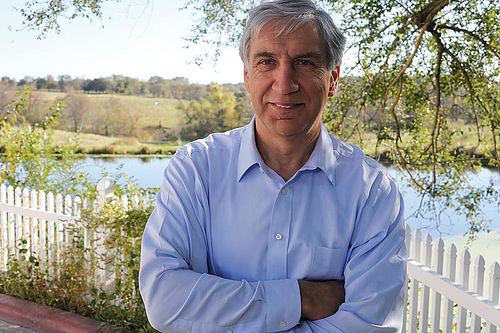
Photo credit: Radim Schreiber
One of the most important races that you haven't heard about yet in this election cycle is currently unfolding in America's Heartland, and it's generating national attention. Francis Thicke, the Democratic challenger in the race for Iowa Secretary of Agriculture, is turning heads and shaking up the status quo in a campaign that geared up in the wake of an egg recall crisis over the summer, shining a light on current unsustainable food-production practices and oversight while taking on Big Agriculture.
Thicke is an organic dairy farmer from Fairfield, Iowa, and his message, which strikes at the heart of the problems of our food system, is inspiring endorsements from some of the nation's foremost advocates for sustainability in agriculture and food production including Jim Hightower, Bill McKibben, Wes Jackson, Wendell Berry, and Fred Kirschenmann. The race is statistically a dead heat. If Thicke wins, Food, Inc. director Robert Kenner said, "He will be a game changer who can fix our agricultural system."
Environmental news website Grist pointed out, "It would be a huge win, not only for sustainable agriculture in Iowa, but the nation. It would send a clear message to Congress as lobbyists and activists begin putting on their battle overalls for the next farm bill."
As food movement leader Michael Pollan (author of Omnivore's Dilemma and In Defense of Food) put it, "For the food movement, the most important election this year may be Francis Thicke's in Iowa."
His campaign is also attracting young volunteers from all over the country, and senior campaign staff member stated, "People across the country are finding they have a champion in Francis Thicke. Big Ag, despite having millions of dollars in PAC money at its disposal, can't quiet them now."
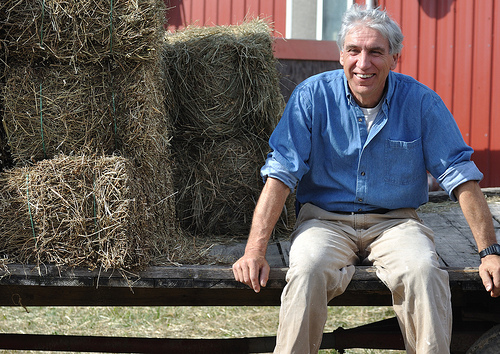
Photo credit: Will Merydith
An Interview with Francis Thicke
Mike Ragogna: You're going up against some big interests. Has corporate agriculture gained such a threshold in our food production system that you're against insurmountable odds?
Francis Thicke: It's true that my opponent's campaign is getting a lot of money from Monsanto, Syngenta, DuPont and other agribusiness giants that are heavily invested in the status quo. Contributions to my campaign are much smaller, but they number in the thousands and are coming from a broad base of supporters.
This tells us there is a growing grassroots movement of people who want to know where their food is coming from, and who are demanding that agriculture do more to produce safe and nutritious food and protect the environment. Fundamental change is coming, and I think the Iowa Secretary of Agriculture should help provide the vision and leadership needed make the transition to a food and agriculture system that provides healthy food, protects the environment and is profitable for farmers.
MR: Your opponent says that oversight of the egg industry is a federal responsibility. What can you do as agriculture secretary to increase safety?
FT: Iowa produces the most eggs of any state, and also has "habitual violator" Jack DeCoster operating here. We should be a leader in egg safety and should adopt the successful egg-safety program developed in Maine. If FDA eventually proves it has the wherewithal to ensure egg safety, Iowa could then suspend its program. It would be good if we could count on the FDA to ensure the safety of our egg supply. However, I am not convinced FDA is yet up to the task, and in my conversations with the Maine State Veterinarian's Office, they are not convinced either, and plan to continue Maine's producer-funded program.
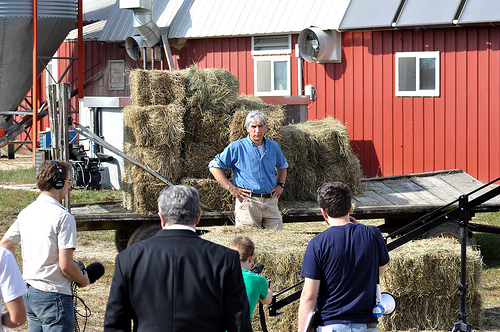
Photo credit: Will Merydith
MR: Who's pocketing the profits now?
FT: Much of the profits in agriculture enrich corporate middlemen at the expense of family farmers and consumers. Agricultural markets have become increasingly concentrated and monopolized over the years. In fact, an average of less than 10 cents of every food dollar makes its way back to the family farm.
We need Teddy Roosevelt-style trust busting to break up those corporate monopolies and restore competition to our Ag marketplace. Also, we should look to how we can structure newly emerging markets in ways that retain more profitability for farmers. For example, when farmers produce food for local consumption they can market directly to consumers and receive the full value of their products. Also, the next generation of energy systems for agriculture should be at a scale that can be farmer-owned and keep the wealth created in the pockets of farmers, and their communities.
MR: Aren't factory farms creating a lot of conflict in Iowa?
FT: Concentrated animal feeding operations (CAFOs) have proliferated across Iowa in the last couple decades. That has caused a lot of divisiveness in rural communities as farmers and rural residents who have lived in the country all their lives -- or for generations -- have found their lives turned upside-down by the odors and toxic fumes from CAFOs, which negatively affect their quality of life, health and property values.
What is not well understood is that the smell coming from a CAFO is not the smell of manure. Manure in the liquid manure pit of a CAFO undergoes anaerobic putrefaction, in which hundreds of volatile organic compounds are produced right in the manure slurry. One of the more familiar compounds, hydrogen sulfide, is so toxic that if the ventilation system of the CAFO fails, the hogs or CAFO workers can die in a matter of minutes. Studies show that these toxic compounds can harm the health of neighbors. That is why CAFOs need adequate regulation to protect the quality of life, health and property values of their neighbors.
MR: Doesn't Iowa have some of the richest topsoil in the world?
FT: We do, but we're losing our topsoil faster than it naturally replenishes itself. Research shows that soil regenerates itself at a rate of about half a ton per acre each year. Corn and soybean production results in an annual soil erosion rate of about five tons per acre -- ten times the rate of regeneration. Clearly, that is not sustainable.
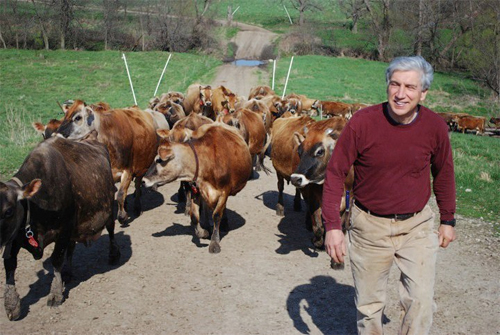
Photo credit: Rob Hubler
MR: How does crop production in Iowa contribute to the Dead Zone in the Gulf of Mexico?
FT: Annual crops like corn and soybeans actively grow and take up nutrients for only about four months out of the year. During the remaining eight months, the soil is not well protected from erosion and nutrient loss to water resources. Water that percolates through the soil when plant roots are not actively growing will take soluble nitrogen with it as it drains down to the buried field tile drainage system and from there to streams and rivers, and eventually to the Gulf -- where the nitrogen will stimulate algal blooms. When the algae die and decompose, the water becomes depleted of oxygen to the point that sea life must leave the area or die, hence the term "Dead Zone."
Perennial crops actively grow and scavenge nitrogen from the soil for much longer during the year. Studies show that 20 to 30 times less nitrogen will escape the root zone of perennial crops in comparison to annual crops like corn and soybeans. The best solution to reducing the dead zone is to increase the use of perennial and cover crops in the Mississippi River Basin. There are two ways we can move in that direction: 1) by moving livestock production out of CAFOs and onto pastures of perennial plants, and 2) by converting biofuel production to using perennial crops for the biomass source.
We should also look to how we can hasten the research efforts of the Land Institute and other research organizations that are working to perennialize grain crops so grains could be harvested annually without the problems associated with annual replanting of crops.
MR: You've been billed as the only candidate for statewide office in the country who's running on a platform of sustainability. What does that mean not only for Iowa, but for the rest of the country?
FT: Iowa has long been a leader in agriculture and should be a leader in the transition to a more sustainable agriculture and food system. Change is coming, and will probably be driven largely by escalating energy costs, because today's industrial agriculture is highly dependent on fossil fuels, and we are at the end of the cheap fossil fuel era. It's not a matter of whether change will come. It's a matter of whether we will have the foresight and planning to make an orderly transition to an agriculture that is energy self-sufficient and sustainable, or if we will wait until it is too late and will be forced to change in crisis mode. If we begin to plan and transition now we can create a thriving agriculture and rural economy that is energy self-sufficient and not at the mercy of volatile energy prices.
I think we need increased research and development of farm-scale biofuel systems that produce energy to power farms (instead of ethanol for cars) and use soil-saving perennial crops -- such as prairie plants -- as the biomass source. The use of perennial crops for biofuels will require much less input of fuel, fertilizer and pesticides to grow the crops and will help protect the soil from erosion and nutrient losses that contaminate our water resources.
We have the necessary tools to build a food system that is socially just, environmentally sound, and economically viable.
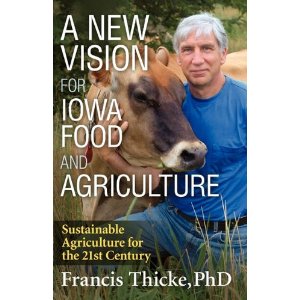
(Note: Special thanks to Will Merydith & Erika Richards)
